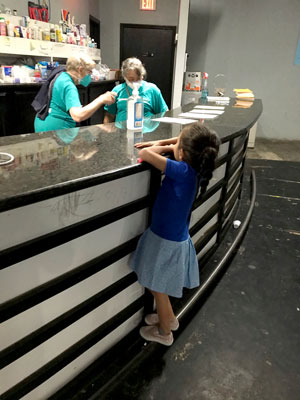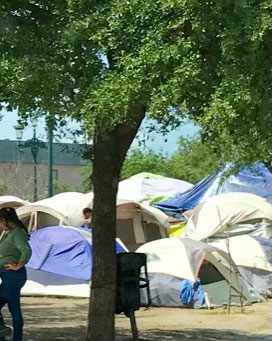Recently, we traveled to the border with a group of colleagues from Chicago, New York and Washington, D.C., led by the Hispanic Heritage Foundation. Our mission was to understand the current situation that people face at the border as they seek protection in the United States or wait in Mexico to apply for asylum.

We witnessed the extraordinary hope of people who have fled for their lives and made a long, dangerous journey seeking safety. We visited the Catholic Charities of the Rio Grande Valley Humanitarian Respite Center, a converted disco bar, which now provides shelter, meals, and clothing, and helps to arrange transportation and medical care for up to 1,000 individuals daily.
On the day of our visit, 500 people — mostly families with little ones, including a two-day-old infant, resided at the Center. All of them had been tested for COVID-19; those who tested positive were isolated and hosted in hotels for 14 days. With the assistance of the Center, they will travel to reunite with families across the United States. Center Director Sister Norma Pimentel, her staff, and her volunteers give these families hope, security, food, shelter, medical care and most importantly, their dignity.
Most of the people there had been blocked from entering the United States for months by the prior administration. One family with two small children fled their home country because their third-grade son was being recruited by the gangs. Upon arriving to the U.S. border, they were sent back to Mexico to wait for their hearing. They lived in a tent for two months, waiting to enter the United States and begin their asylum proceedings, hoping that the Biden administration would change these policies.
Change has not come fast enough.
When we crossed the border into Mexico, we saw individuals and families still living in “tent cities” in the town square. Families did not have access to running water, food, or medical or mental health care. They faced daily threats of violence, including kidnapping. Despite these deplorable and dangerous conditions, they remained filled with hope that the current administration will change its policies before it’s too late.

Under U.S. and international laws, asylum is a legal right in the United States. Every day, thousands of people are being denied access to that protection. The Biden administration must end the illegal policies that are making their journeys so dangerous.
First, the president must immediately end Title 42 border expulsions, which have trapped these families in dangerous conditions, and policies that exclude survivors of domestic and gang-related violence from protection.
Second, those individuals who are permitted to enter the country and reunite with their loved ones must be made aware of their rights and given access to counsel. Otherwise, how does a mother of two small children, not yet able to understand English, navigate our complicated legal system? How does she represent herself before an immigration judge against an experienced federal prosecutor? If we don’t give her a fighting chance, the justice of our system and her family’s lives will be in grave jeopardy.
Third, we need to invest in non-governmental organizations in home countries to advance policies that will allow individuals to remain safely in their homes.
After four years of particularly cruel policies, now is the time to rebuild the U.S. immigration system to fulfill our legal and moral obligations to welcome migrants, treat them with dignity, and ensure a fair chance in court. Civil society organizations like the Respite Center have done their part; now it’s time for the Biden administration to step up.
Mary Meg McCarthy is NIJC's executive director. Oscar A. Chacón is a co‐founder and executive director of Alianza Americas.

